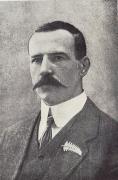|
|
||||||||||||||||||||||||
 |
Featured person
Recently added |
Professor Brian Tate (1921 - 2011): |
||||||||||||||||||||||
Professor Brian Tate was a highly accomplished expert in Hispanic Studies in their broadest sense, covering history, literature, and especially, not only aspects of Spanish history but also early modern Spanish historiography. He was especially interested in and fond of Catalonia and made major contribution to Catalan studies.
Robert Brian Tate was born in Belfast where he went to the Royal Belfast Institution, which at that time had a broad approach to language studies and, unusually for contemporary schools in Belfast, taught Spanish. In 1939 he entered Queen’s University, Belfast, to read for a degree in modern languages; this was interrupted as he volunteered for war service, which he saw in India, Burma and Nepal as a captain in the Gurkha rifles (having begun as a university cadet in the British Army in India). At one point, sheer chance prevented him being part of a convoy destined for Singapore, which would surrender not long afterwards to the Japanese, to everyone’s enormous surprise and with calamitous consequences for the British forces there. He finally graduated from Queen’s in 1948. One of his teachers there was the distinguished Catalan linguist, Ignasi González i Llubera, (Director of the Department of Spanish Language and Literature and Professor (1926-1960) who encouraged Tate to go to Catalonia to study the history of that region, an academic discipline banned by General Franco. Tate would later reminisce about the teachings and influence on his dedication to research exerted by the first Catalan he had met in his life. Catalan would later become his favourite language, which he learned to the level of lecturing and writing in it.
He completed his Master’s degree at Queen’s in October 1949; his thesis, The Life, Works and Ideas of Cardinal Margarit, was the first major work on this Catalan figure and was later published by the Institut d’Estudis Catalans, Barcelona, as El manuscrit i les fonts del Paralipomenon Hispaniae, and won him the Francesc Cambó Prize from that institution. He completed his PhD at Queen’s in 1955 on late-mediaeval historical writing in Catalonia and Spain. He himself lectured at Queen’s, but moved in 1956 to the almost-new Department of Spanish at the University of Nottingham as Reader and then in 1958 Professor of Spanish.
His list of publications, all of which were critically acclaimed, is considerable. One notable piece was an edition of his work on Margarit which appeared in Catalan as Joan Margarit i Pau, cardenal i bisbe de Girona in 1976 and was regarded as a major milestone in the resumption of historiographical studies in Catalonia. Other works included essays, translations from various languages, and several festschrifts were published in his honour. Especially notable were studies on the Roman poet Virgil, and the Portuguese poet Camões.
His professional and academic distinctions included (corresponding) fellowships of the History-Archaeology Department at the Institut d’Estudis Catalans, Barcelona; the Real Academia de Historia, Madrid; and the Reial Acadèmia de bones Lletres, Barcelona. In 1980 he was appointed Fellow of the British Academy. In addition he was President of both the Association of Hispanists and also the Anglo-Catalan Society; he was a committee member of the Asociación Internacional de Hispanistas and active in a body, the Historians of Medieval Iberia Group, a more informal academic group. He was a visiting professor at Harvard, Cornell, the State University of New York in Buffalo, Austin and Charlottesville, Virginia in the United States. His close connection with the University of Girona was recognised by an honorary doctorate in October 2004– he delivered his acceptance speech in Catalan – and the foundation of the Tate Collection, founded on all his Catalan materials which he donated. As he said in his doctoral acceptance speech: “Here in Girona I began my work, and here I end it”. He regarded this as his most favoured of all his awards. The Catalan Historical Review said of him that his name “deserved to be written in golden letters in the history of Catalan culture.”
His obituarist in The Times wrote: “his contributions in books and articles have given rise to a new assessment of the late Middle Ages in Spain, an endeavour marked by his revelation that the history of the Middle Ages and the early Renaissance in Spain entailed complex processes of transition and a comprehension of the ideologies, politics and narrative strategies of their historians and historiographers. These perceptions shape his extraordinary study on the mediaeval kingdoms in the Iberian Peninsula in Spain. A Companion to Spanish Studies dating from 1973.”
Tate and his wife of 60 years had two children; he worked with his son Marcus to produce The Pilgrim Route to Santiago, on the famous Way of St James.
| Born: | 17 December 1921 |
| Died: | 21 February 2011 |
| Richard Froggatt |
| Bibliography: Catalan Historical Review, 4: 153-155 (2011); Institut d’Estudis Catalans, Barcelona; Obituaries: The Times, 2.3.2011; The Guardian, 21.4.2011 |


Home | Our Policies | Plaques | Browse | Search | Sponsors | Links | Help | Contact
Privacy & Disclaimer | Cookie Policy | Site Map | Website Design By K-Point
© 2024 Ulster History Circle









